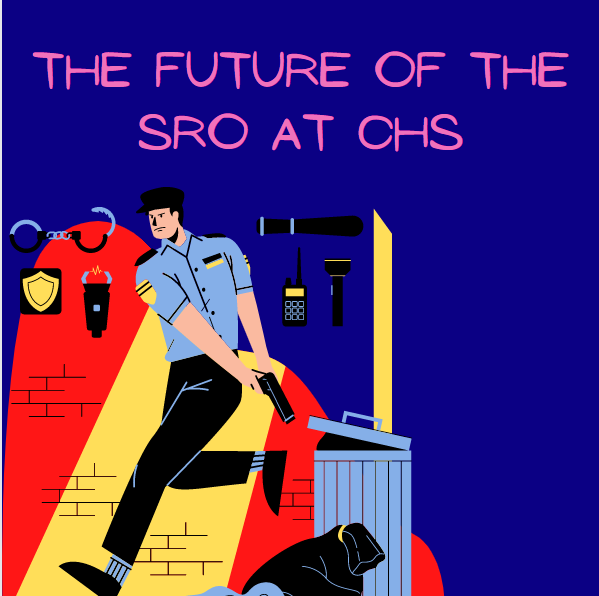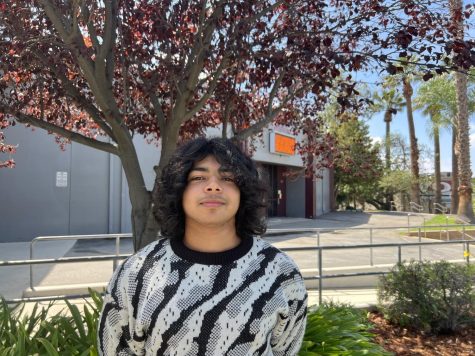The Future of the SRO at CHS

Following last school year’s extensive student-led efforts to get the SRO removed from CHS’s campus and get the money spent on the SRO’s salary reallocated into comprehensive, adequate, and preventative mental health measures, many Claremont students are confused over the reappearance of a police officer on campus. For those unfamiliar, SRO stands for School Resource Officer. Their job is similar to that of a normal police officer; they are able to make arrests, respond to calls for service, and document incidents. The movement to get the SRO removed off of CHS’s campus began about two years ago when students brought up issues of historic police violence, discrimination, discomfort, and safety issues.
Recent CHS graduate Kalilah Hamid, who worked on the initiative to get the SRO off of campus, explained the reasoning behind the movement.
“The funding that is meant to go to mental health resources and support for students is instead reallocated towards funding a police officer on campus, which has been proven to be not only ineffective but also harmful,” Hamid said. “It has been statistically proven that the anxiety and stress levels of students of color go up when they are surrounded by police officers. The whole role of the officer is to protect and ensure the safety of students but since their position does otherwise it’s unnecessary to have one on campus.”
To get a better understanding of the matter, Caleb Mason, a decorated member of the Claremont Police Commission since 2015, was able to detail his position and the effect it has on the SRO.
“The Police Commission is an advisory body made up of, currently, eight members, with three main functions: (1) advise the Police Department on policy; (2) serve as a liaison between the department and the community, and (3) participate in internal investigations of alleged misconduct by officers,” Mason said.
The Police Commission plays a vital role in keeping the Claremont Police Department in check and helping to prevent any misconduct in the department. They also have a significant influence over the presence of the SRO on campus––just having unanimously voted last year to have the City Council and the School Board re-evaluate and vote on the SRO position in May of 2022.
While it seems that the majority of students are not fond of the presence of an SRO on campus, some 66% of 138 CHS students polled by the Claremont Police Commission on the matter, Mason still believes that the police department and SRO actually play a very useful role in the safety of schools. However, what the role will look like will be officially decided this May, and until then the current SRO will serve on campus in an interim position.
The implementation of body cameras in the Claremont police department, especially on the SRO, has been a heavily debated topic for a while. Many argue that it is the best way to approach the issue of the SRO that will satisfy all parties involved. Under the same umbrella, many also feel a solution is to have the SRO carry only nonlethal weapons, drive unmarked cars, and not dress in uniform when on campus. While these options all seem good in retrospect and 74% of the 57 students polled on the Wolfpacket instagram feel these measures would ameliorate the discomfort caused by the SRO now, according to City Council Racial Equity Board member Rolondo Talbott they are not enough.
“If you have an officer who is in plain clothes, or driving an unmarked car on campus, the data doesn’t support that those things necessarily alleviate or make anything better…,” Rolondo said. “When you look at the data, and you put it in the context of Claremont, being such a small city, the data is very clear that there is no net benefit in having any form of an SRO on campus.”
One thing is for certain, students want to be involved in the decision making and their voices want to be heard. The school board should be trusted to work in tandem with students to assess the situation and plan the final results. Students are the primary group that the SRO will interact with all day, it is vital that they feel comfortable going to school every day. It is crucial that the school board and police department do everything in their power to ensure that is the case.
Hello there! Our goal is to provide relavent, engaging journalism for readers of all ages. Your donation will support the student journalists of the Wolfpacket at Claremont High School, and will allow us to purchase equipment, print our monthly issues, and enter in journalism competitions. We appreciate your consideration!

Lorenzo is a Senior at Claremont Highschool and a reporter for the Wolfpacket. Their current favorite musical artists include Youngboy Never Broke Again,...

Isha Raheja is a senior at CHS and Assistant Editor-In-Chief as well as social media manager. Throughout her two years in the Wolfpacket, Isha has loved...











